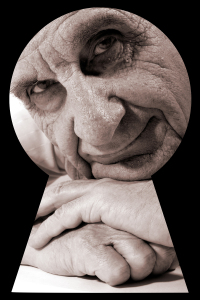The Web started the decline of privacy; it is the personal camera that really nails it dead.
Privacy is dead, get over it: the community now knows as much about you as your neighbour does if you live in a village, or your doorman if you live in an apartment block. And anyone who sees you can record what they are seeing.
 I blogged a whole series of posts some time ago on "Big Uncle": about how the loss of privacy can be a good thing - "Big Uncle" - or a bad thing - "Big Brother". It's up to all of us to get the society we deserve. And it is especially up to people in IT because we build and operate the systems that impose on privacy.
I blogged a whole series of posts some time ago on "Big Uncle": about how the loss of privacy can be a good thing - "Big Uncle" - or a bad thing - "Big Brother". It's up to all of us to get the society we deserve. And it is especially up to people in IT because we build and operate the systems that impose on privacy.
Don't think I'm anti-privacy, but clearly I'm not as upset about the loss of privacy as some.
First there's no point getting all worked up. It is not that I promote these developments: simply, there's no point trying to turn back the clock. As I posted more recently "Privacy is becoming impossible again, whether we like it or not."
Second, I hate advertising. If advertising will get more targeted to what I actually might want to buy, I don't see that as a bad thing. Profiling doesn't creep me out: it is an opportunity for vendors to add value. Given the amount of "herb" I smoked in my younger days it's amazing I'm not more paranoid, but I'm not. Perhaps I got it all out of my system back then. It seems to me that most of those who think the State is watching them personally either need to be watched or need a pill. Sure i know there are exceptions. As I said in that recent post
I never said "nobody has a right to anonymity". In fact I mentioned several valid use cases... Nevertheless I can present valid use cases where theft is a reasonable action, or even killing. Presenting a few emotive situations doesn't make a rational argument. I believe there are many more undesirable use cases for anonymity, such as stalking, trolling, vandalism, terrorism, extortion, character assassination, organised crime, and paedophilia.
Third, I love some of the effects we're seeing from loss of privacy. How about this nasty piece of work getting what she deserves? Or these scum? You can't get away with anti-social behaviour any more. I'm mystified by those who see this as a bad thing. The biggest transformation borne by the Web is universal access to knowledge. But the second biggest - driven by the personal-camera - is in bearing witness. The bullies are on show at last, whether in the school-ground, the bus, or in a police uniform. This isn't that new: remember Rodney King, or Tienanmen Square. But now it is ubiquitous. Just today I read "it’s O.K. to take pictures of people again". If you can be seen in public, that seeing can be digital. The personal-camera changes everything.
Fourth, I live in a country where I trust the police. I'd ask one for help or directions. When I eventually wander off with Alzheimers, I quite like the idea they can find me again. When someone's daughter runs off at 14 with a 35-year-old truck driver she met in a chatroom, I'm quite keen that they can be tracked down. Big Uncle or Big Brother - you get the society you deserve.
I'm a rational optimist. I hope nuclear power is going to save us from global warming, once the Germans and others get over their hysteria. And digital inter-connectedness is going to save us from the evils of anonymity, from trolls to terrorists.
The Web started the inter-connectedness, the loss of privacy. The personal-camera is finishing it off.


 Made in New Zealand
Made in New Zealand 

Comments
Slowly slowly you hear the rumble of the shift
Interesting article: The End of Social (via @chrisdancy)